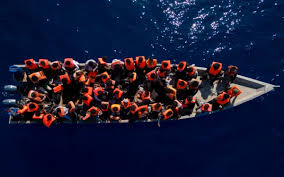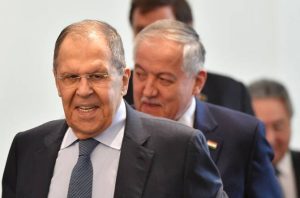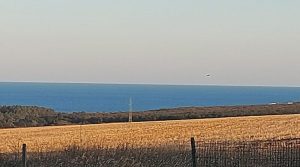New Polish government should advocate for EU enlargement

Brussels: A swing towards a pro-European majority in Poland after the 15 October elections gives hope that the next government will engage constructively with Germany and France on the difficult issue of further EU enlargement, argues Sylvie Kauffmann in an interview with Visegrad Insight.
Wojciech Przybylski asked Sylvie Kauffmann, foreign affairs columnist at Le Monde, about the impact of a change in government in Poland on relations with France and Europe.
Wojciech Przybylski: Being so savvy regarding central European politics and Poland, I wanted to ask how you reacted to the Polish elections and the opposition winning a majority.

Sylvie Kauffmann: I was surprised like I think probably most of us.
I was in Berlin on Sunday night. There was a big match in France, the Rugby World Championship and a quarter-final between France and South Africa. I had a couple of South African colleagues who found a pub to watch this game and asked if I wanted to come.
And I said, no, I have a more important game to follow. The result of the Polish election.
I was pleasantly surprised. For us in Paris, probably a very important dimension of this surprise, and a very positive one, is the consequence for democracy. It means that there’s an alternative to populism and that an election is still a very powerful tool. And it works because the turnout in Poland was very impressive.
In France, we traditionally had a fairly high turnout, but over the past few years, it has been steadily declining, particularly among young voters. The fact that in Poland you have been able to mobilise so many voters, particularly the young, is a lesson for all political parties in Europe where we have democratic problems. This election was inspiring and heartwarming in other parts of Europe.
The turnout, at 74 percent, was indeed impressive. What I’m interested in is the impact on French-Polish relations. If you look at the past and the future, do you think much will change? What is the potential for the Polish-French relations?
It’s a difficult question to answer because of the moment we are at in Europe, a very crucial moment. We may try to muddle through and do more of the same, we can do a little better, or it may end up a little worse, but I think we don’t have the luxury of this. I think that what is awaiting us with Ukraine is going to be a change of a huge magnitude. If we do go ahead and try to integrate Ukraine and other countries into the EU, it will have an enormous impact on all of us.
I think the French government is very active in trying to assess that because President Emmanuel Macron had this shift about enlargement. He was traditionally quite reluctant to enlarge the European Union. And last year, it changed completely, fundamentally.
And now France is very committed to the principle of enlargement to Ukraine, but we don’t know yet all the details of how it will happen. And Poland is a crucial part of the strategy for enlargement.
Not only because it’s gone through enlargement itself before but also because of its position in Europe, geographical and political, because of its particular relationship with Ukraine. I hope, of course, it will get much better with this new government.
Poland is also important in the economic context – we have seen the problems caused by the import of Ukrainian grain, and this will not go away. We will have a huge impact of integrating Ukrainian agriculture on your farmers and the French farmers. And that’s only one piece of the puzzle. So in that context, the French-Polish relationship will be very important.
The German-Polish relationship will also be extremely important. Ideally, we should have a format – I don’t know if we should call it the Weimar Triangle or something else – where those three poles of Europe: France, Germany and Poland get together and work towards the enlarged Europe.
Not so long ago, we had a bilateral group of experts commissioned by the European Ministers of France and Germany to investigate the possible path forward for future enlargement and the challenges for the internal set-up of the European Union.
Do you think we would need a similar exercise between Poland and France, or should Poland rather join in and submit its additional perspective?
Poland should join this work because we have seen over the past 18 months, with the war in Ukraine, that the existing European Union is already very different.
The power balance – I don’t think it has spectacularly shifted to the east as we thought at the beginning of the war. But I think the political dynamic is more important now in the eastern part of Europe, and we can see already in Brussels that voices from Central Europe and the Baltic States are heard more. I would say that’s a good development.
The PiS (Law and Justice) government (in Poland) was so Eurosceptic that it was very difficult to include them in such a conversation or work on the future. The relationship with Germany was terrible, and with France, it was not so good either. But now that we will have a government in Warsaw, which is much more open and pro-European, it should definitely be included in those conversations.
We have seen an unprecedented amount of military purchases in Poland and an increasing interdependence with the United States on European security. How would France react if the pro-American line in Warsaw remained the same or the new government advocated for even more investment in transatlantic relations?
We shouldn’t kid ourselves in Western Europe and think that Poland is going to change course completely and that every single problem will be solved because there’s a new government.
There are things ingrained in Polish politics, and I think the strength of the transatlantic relationship is one of them. And that’s OK. As long as you have an administration like the Biden administration in power. But we have an election next year in the US and if Trump comes back, this will be very different. Warsaw will have to look carefully at what the transatlantic relationship is. And you touch a raw nerve for the French government over the question of defence procurement. You remember one of the big issues between France and Poland when PiS came to power and decided to drop the (French-made Caracal helicopter) contract. That was a huge disappointment for France and a traumatic experience in the Polish-French relationship.
If Poland is serious about building Europe and particularly if events take a wrong turn in the United States next year, Warsaw should look more seriously into the European defence industry.
I know everybody in Europe is very suspicious of the French because when they say, “You should buy from the European defence industry,” they think the French mean “buy French”. And that may be partly true.
But I think we are talking about the European defence industry here. The war in Ukraine has taught us a very big lesson, which is that we should not only develop the European defence industry but also harmonise (and) standardise it.
This is a huge task that we have to do together. Poland has a key role to play. I don’t know if the new government will stick to the (previous cabinet’s) purchase commitments, but it’s bound to spend a lot of money on its defence because, as we know, Russia will not move anywhere. This will be a very important question that the next government will have to consider.
There is one more thing related to this subject – I think Macron has been softening his stance on NATO. There was this huge outcry when he said that NATO was brain-dead. And when he was promoting the idea of strategic autonomy, there was a suspicion that it meant moving away from NATO. Since Russia invaded Ukraine, Macron has made it clear that strategic autonomy, or European sovereignty, meant strengthening the European pillar of NATO.
I think he’s pretty sincere about this because he understands there’s no other way, and I think that will probably help the dialogue with the next Polish government.
If you were to advise the next Polish government on what should be the beginning of a conversation with President Macron and the French administration, what would that be?
It’s not up to me to advise, but I think it would be very important to start a conversation honestly and openly about EU enlargement. I’m personally very worried about enlargement. I think everybody now in Europe accepts that it has to be done, which is a good thing, but nobody has any idea how we are going to do it. And Poland really has an important role to play.
I think France is in two minds – they really want Ukraine to be integrated into Europe. But remember that we are among the founding members. For the founding members, the European Union is part of our DNA. The European project for the French is something that we care about.
We don’t want the Union to be destroyed, and we know that enlargement will be risky. We want it to happen, but we know it will be very difficult. So, from my own point of view – I’m not sure the Elysee will have the same priority – the next Polish government could play an important role in this area.





